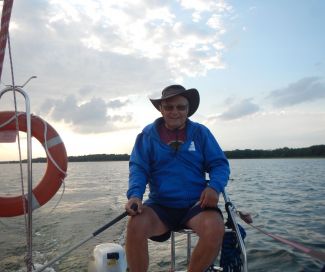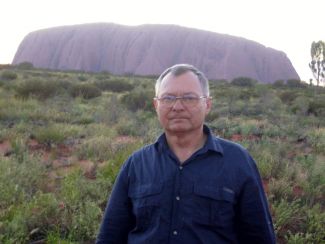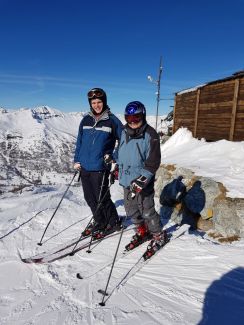From 1984 to 1985 he lectured at Institut des Télécommunications d'Oran in Algeria. From 1985 to 1991, he was associate professor at Laboratoire d'Automatique et d'Analyse des Systèmes du C.N.R.S. (LAAS) and Institut National des Sciences Appliquées in Toulouse, France. Between 1992 and 1996, he was the deputy director of the Institute of Electronics at TUL, and since 1996, he has been the head of the Department of Microelectronics and Information Technology at TUL, which he founded. From 2002 to 2008 he was the Vice-Rector of Lodz University of Technology for promotion and international cooperation.
In 2008 he received an honorary doctorate from Yaroslav-the-Wise Veliky Novgorod State University (Russia). In 2020 he was awarded an honorary doctorate by Gdynia Maritime University.
For many years, he has conducted research and lectured at universities in Algeria, France, Belgium, Denmark, Finland, Spain, Switzerland, Italy, Great Britain, Tunisia, Honduras, Canada and the USA. Depending on the season, he devotes his free time to his two great passions: skiing and sailing.
Skiing is probably your greatest passion. When did your skiing adventure begin?
I was three years old. My grandparents took me to Śledzia Park and to the hill in Smardzew. It was there that I gained my first skiing skills. We went skiing with my parents to Zakopane almost every year. Later, as a student of Lodz University of Technology, I went with my friends to Szczyrk and Zakopane.
What are your favourite places and slopes?
I really like the slopes in the French Northern Alps, specifically Val Cenis, the Italian Alps in Sestiere as well as Mont Blanc, and especially the French Pyrenees and Andorra, as well as Whistler in Canada.
What do you feel when you ski?
I feel relaxed and free...
Sailing is your other great passion. Where and what kinds of ship do you most often sail?
I have held a sailing licence since 1968. I obtained my first skipper certificate in Warsaw in 1982, and another one in Łódź in 2000. I also have a VHF radio operator certificate issued in Gdynia in 2001. I have used these qualifications during sea voyages.
I sail on yachts of the Sailing Club of Lodz University of Technology, on various Alfa and Beta type sailing boats. I have also travelled on the frigate ‘Dar Młodzieży’ (Gift of the Youth). I was on it on four voyages, including two long ones: in Riga in 2005 and in Oslo in 2006. I also sailed with Jurek Tomczyk, one of the commanders of TUL Club, on the Mediterranean Sea. We were together in Croatia (2001), Spain (2002), Greece (2012) and Italy in 2013.
You must have your favourite sailing spots.
I like the Masurian lakes the most. This is where I most often spend my holidays with my family. I've been actively involved in TUL Sailing Club, located in Roganty, since 1967, i.e. almost from its beginnings at Lodz University of Technology.
Which voyage do you remember the most?
My most memorable trip was to Greece. Suddenly, unexpectedly, there was force 12 wind on Beaufort scale and the boat turned into a speedboat. Fortunately, I veered away and hid behind an island and it calmed down.
You spent many years as a lecturer in France and Algeria. Did you find time for your passions there too?
Yes, in France I worked in Toulouse, which is close to the Pyrenees so I went skiing and even organised trips with students. They stated that the ending ‘ski’ in my surname says everything about me ... I spent 20 years there, and when I came back to Poland, I went to Toulouse every year for the winter period. The academic year there is divided into 5 parts, 6 weeks each.
In Algeria, on the other hand, I travelled by Fiat 126P, which took me across the Sahara desert. I had problems, because at that time, in Algeria, the weight of the vehicle gave right-of-way and to increase its weight you had to honk. Once my horn broke and I could not get home from work.
You love travelling. Which of the trips made the biggest impression on you?
I have seen many beautiful places all over the world. I have been to India, Ceylon, Malaysia, Thailand, the USA, Canada and Honduras. I was most impressed by Australia, especially Uluru. This is the sacred rock of the Aborigines, otherwise known as Ayers Rock. The symbol of Australia, the biggest attraction and the destination of trips to Uluru National Park.
You had many adventures during your trip. Did you ride a camel and an elephant?
Yes, and even a turtle. I rode a camel and an elephant when I was in Ceylon and a turtle when I was in Malaysia.
I know you have infected your immediate family with your passions. Your eldest son Piotr Napieralski is already a TUL associate professor and also a computer scientist. Have you instilled all your interests in him?
All my children are great skiers and snowboarders. My grandchildren have also learnt. They started at the age of 2-3.
Piotr and I have many interests in common, apart from computer science. We go skiing together. We went sailing together in 1990, he was 15 then.
You have had as many as 57 PhD students. Have you managed to instil your passions in them?
As a teacher I have always tried to encourage my PhD students to practice sport sport. Now it's my PhD students who invite me to go skiing and sailing. Some of them are already professors in the USA and Canada. This is a great satisfaction for a lecturer.
Why is it worth having passions in life?
It makes you want to live... Passions give you strength to act and work is a pleasure. It was our interests that allowed us to build ARUZ. It is large-scale, massively parallel FPGA-based analyzer of real complex systems, which is located in Lodz Technopark. When I was at the University of Houston-Downtown, Americans were amazed that such a small country - Poland - has the largest re-configurable computer in the world. At that time, I was interviewed on Chicago radio, and the whole Polish-American community listened to it...
Interviewed by Małgorzata Trocha



